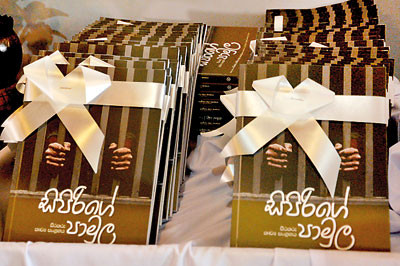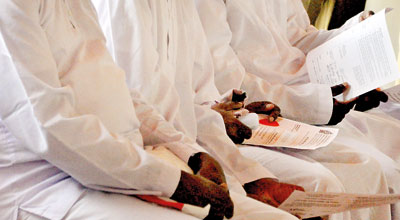News
Penning poems from within prison walls

Chandana Ekanayake
At a time when news regarding the country’s prison system is more grim than good, an event held this week at the Prisons’ Headquarters in Colombo highlighted how some of the rehabilitation programmes that have been introduced are reaping positive results.
One of these included the launch of a book containing 100 poems penned by prisoners, the first time such a venture has been undertaken. The brains behind the prisoners’ poetry book project is Chandana Ekanayake, Commissioner of Prisons in charge of Rehabilitation at Prison Headquarters in Colombo. He is committed to ensuring that the bold words written on the outer wall of the Welikada Prison “Prisoners are human beings too” are not confined to mere words but are put into practice so that inmates are given a fair chance to make the most of the years they spend in prison.
“Those who are serving long sentences undergo various emotions. They are separated from their loved ones. They lack both emotional and physical relationships and many repent the actions that led to their imprisonment. One way they can give vent to their bottled up feelings is by writing, and this is what I encouraged them to do,” Commissioner Ekanayake said.
The project began last year with the setting up of a Prisoners Literature /Art Circle. Inmates were encouraged to write poems or stories with the promise that they would be published. “There are a large number of prisoners who are educated; and from the quality of the poems they put together, people can learn a lot about their experiences,” he said.

The book of poems
Poetry by the prisoners is not altogether a new phenomenon. Since the establishment of Welikada Prison in 1844, for nearly 200 years prisoners have written poems, their compositions written using charcoal line the prison walls. Now prisoners have access to pen and paper and they can write in a more systematic way.
“Those serving sentences have committed crimes ranging from murder to financial crime, and drug related offences etc. Once they are incarcerated, the responsibility of rehabilitating them lies in the hands of the prisons officers. Developing their skills in the arts is one approach and it helps to bring out their latent creativity too,” Commissioner Ekanayake said.
The poems give an insight into their inner thoughts, their unhappiness at being away from their loved ones, loneliness, the hardships they face and their regrets. The poems also carry messages to their peers and youngsters on the outside not to take the road they took.
It’s the first time such a book has been published in the history of the Prisons’ Department, and Commissioner Ekanayake is immensely proud of that fact. “An idle mind is the devil’s workshop they say and this is more so when people live in a confined space with little to do. Engaging them in this kind of activity allows them to reflect on their past actions and realise their misdeeds.The hope is that when they are released from prison, such activities will help them become useful citizens,” he said.
Prisoners not only stand condemned in the eyes of the law, but once in prison they are often condemned by society too. This stigma is one that Commissioner Ekanayake hopes will fade away with the new correctional programmes that have been put in place.
“We have begun English classes for inmates, conducted by the prisoners themselves. There is an army officer, a doctor and five teachers who are inmates and they conduct the classes. It gives them all a sense of dignity even within the prison walls,” he added.

Inmates at the event to launch the book. Pix by Priyantha Wickramaarachchi

